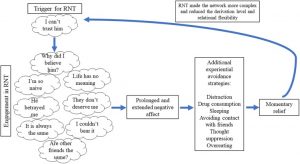Improve Psychological Health with a Self-Guided, Smartphone-Based Mindfulness App
By John M. de Castro, Ph.D.
“Another part of the appeal of smartphone-based apps is their anonymity. “The apps also allow for privacy and confidentiality and can be a safe space for individuals who may be too ashamed to admit their mental health issues in person or who may feel that they will be negatively labeled or stigmatized by others,” – Sal Raichback
Mindfulness training has been shown through extensive research to be effective in improving physical and psychological health. But the vast majority of the mindfulness training techniques, however, require a trained therapist. This results in costs that many clients can’t afford. In addition, the participants must be available to attend multiple sessions at particular scheduled times that may or may not be compatible with their busy schedules and at locations that may not be convenient. As an alternative, mindfulness training with smartphone apps has been developed. These have tremendous advantages in decreasing costs, making training schedules much more flexible, and eliminating the need to go repeatedly to specific locations. In addition, research has indicated that mindfulness training via smartphone apps can be effective for improving the health and well-being of the participants.
In today’s Research News article “Testing the Efficacy of a Multicomponent, Self-Guided, Smartphone-Based Meditation App: Three-Armed Randomized Controlled Trial. JMIR mental health.” (See summary below or view the full text of the study at: https://www.ncbi.nlm.nih.gov/pmc/articles/PMC7732708/ ) Goldberg and colleagues recruited adults who did not have extensive meditation experience and randomly assigned them to a wait-list control condition or to receive either of 2 8-week smartphone app mindfulness training with the Healthy Minds Program. They received 4 weeks of awareness training including awareness of breathing and awareness of sounds. They were then again randomly assigned to receive 4 weeks of either Connection training consisting or gratitude and kindness practices or Insight Training consisting of “the changing nature of the phenomenon (ie, impermanence) and examining how thoughts and emotions influence perception” practices. They were measured before after the first 4-week module and after the second 4-week module for mindfulness, psychological distress, perceived stress, interpersonal connections, interpersonal reactivity, compassion, self-reflection, rumination, and defusion.
They found that compared to baseline and the wait-list control group both intervention conditions produced significant increases in mindfulness, social connection, self-reflection and defusion and significant decreases in psychological distress, and rumination with no significant differences between the smartphone interventions. There were no differences between the wait-list controls and the intervention in compassion and empathy.
These are interesting findings that correspond to the finding in prior research that training the increases mindfulness produces significant increases in social connection, self-reflection and defusion and significant decreases in psychological distress, and rumination. They demonstrate that smartphone trainings that improve mindfulness produce improvement in the psychological health of the participants.
It was a bit surprising that the benefits of the awareness plus connection training did not significantly differ from the benefits of awareness plus insight training. But since both trainings equivalently higher mindfulness and increased mindfulness has been shown to produce these benefits, it is reasonable to conclude that any training the improves mindfulness will improve psychological health..
So, improve psychological health with a self-guided, smartphone-based mindfulness App.
“Using a smartphone app, may provide immediate effects on mood and stress while also providing long-term benefits for attentional control. . . there is evidence that with continued usage, [mindfulness training] via a smartphone app may provide long-term benefits in changing how one relates to their inner and outer experiences.” – Kathleen Marie Walsh
CMCS – Center for Mindfulness and Contemplative Studies
This and other Contemplative Studies posts are also available on Google+ https://plus.google.com/106784388191201299496/posts and on Twitter @MindfulResearch
Study Summary
Goldberg, S. B., Imhoff-Smith, T., Bolt, D. M., Wilson-Mendenhall, C. D., Dahl, C. J., Davidson, R. J., & Rosenkranz, M. A. (2020). Testing the Efficacy of a Multicomponent, Self-Guided, Smartphone-Based Meditation App: Three-Armed Randomized Controlled Trial. JMIR mental health, 7(11), e23825. https://doi.org/10.2196/23825
Abstract
Background
A growing number of randomized controlled trials (RCTs) suggest psychological benefits associated with meditation training delivered via mobile health. However, research in this area has primarily focused on mindfulness, only one of many meditative techniques.
Objective
This study aims to evaluate the efficacy of 2 versions of a self-guided, smartphone-based meditation app—the Healthy Minds Program (HMP)—which includes training in mindfulness (Awareness), along with practices designed to cultivate positive relationships (Connection) or insight into the nature of the self (Insight).
Methods
A three-arm, fully remote RCT compared 8 weeks of one of 2 HMP conditions (Awareness+Connection and Awareness+Insight) with a waitlist control. Adults (≥18 years) without extensive previous meditation experience were eligible. The primary outcome was psychological distress (depression, anxiety, and stress). Secondary outcomes were social connection, empathy, compassion, self-reflection, insight, rumination, defusion, and mindfulness. Measures were completed at pretest, midtreatment, and posttest between October 2019 and April 2020. Longitudinal data were analyzed using intention-to-treat principles with maximum likelihood.
Results
A total of 343 participants were randomized and 186 (54.2%) completed at least one posttest assessment. The majority (166/228, 72.8%) of those assigned to HMP conditions downloaded the app. The 2 HMP conditions did not differ from one another in terms of changes in any outcome. Relative to the waitlist control, the HMP conditions showed larger improvements in distress, social connectedness, mindfulness, and measures theoretically linked to insight training (d=–0.28 to 0.41; Ps≤.02), despite modest exposure to connection- and insight-related practice. The results were robust to some assumptions about nonrandom patterns of missing data. Improvements in distress were associated with days of use. Candidate mediators (social connection, insight, rumination, defusion, and mindfulness) and moderators (baseline rumination, defusion, and empathy) of changes in distress were identified.
Conclusions
This study provides initial evidence of efficacy for the HMP app in reducing distress and improving outcomes related to well-being, including social connectedness. Future studies should attempt to increase study retention and user engagement.
https://www.ncbi.nlm.nih.gov/pmc/articles/PMC7732708/









